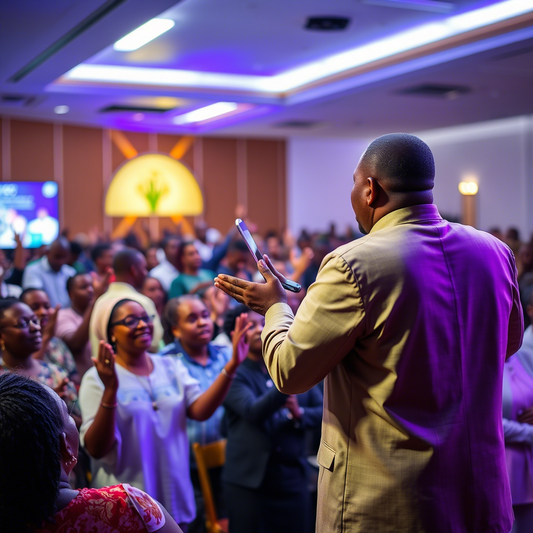
FORBEARANCE AND FORGIVENESS
Share
The Intertwined Paths of Forbearance and Forgiveness
In the intricate tapestry of human relationships and personal growth, two concepts often emerge as cornerstones of resilience and healing: forbearance and forgiveness. While distinct in their application, they are deeply intertwined, each offering a unique yet complementary path towards resolution, peace, and stronger connections.
Understanding Forbearance: The Power of Patient Restraint
Forbearance, at its core, is the act of exercising patient self-control and restraint when faced with provocation, difficulty, or a desire for immediate action. It's the conscious decision to hold back, to delay judgment, or to tolerate a challenging situation without immediate retaliation or condemnation.
Key aspects of forbearance include:
- Patience: It requires a deep well of patience, allowing time for emotions to settle, for understanding to develop, or for circumstances to change.
- Tolerance: Forbearance often involves tolerating imperfections, mistakes, or behaviors in others that might otherwise trigger a strong negative reaction.
- Restraint: It's the deliberate act of holding back from anger, criticism, or punitive measures, even when justified.
- Perspective: Forbearance encourages stepping back to gain a broader perspective, considering the full context of a situation rather than reacting impulsively to a single event.
Where forbearance is applied:
- Relationships: In personal relationships, forbearance allows partners, family members, and friends to navigate disagreements and flaws without constant conflict. It's the grace given when someone makes a mistake.
- Financial Situations: In a financial context, "forbearance" refers to a temporary postponement of loan payments, often granted during periods of hardship. This allows individuals or businesses to recover without immediate default.
- Leadership: Effective leaders often practice forbearance, giving their teams space to learn from mistakes and grow, rather than micromanaging or punishing every misstep.
- Personal Growth: Practicing forbearance with oneself means acknowledging personal shortcomings without self-flagellation, allowing for a process of gradual improvement.
Forbearance is not about weakness or condoning harmful behavior indefinitely. Instead, it's a strategic pause, a conscious choice to manage one's own reactions and allow for a more constructive path forward.
Understanding Forgiveness: Releasing the Burden
Forgiveness, on the other hand, is a more profound and transformative act. It is the conscious and deliberate decision to release feelings of resentment or vengeance toward a person or group who has harmed you, regardless of whether they deserve it or not. It does not mean forgetting, condoning the offense, or reconciling with the offender, though these can sometimes be outcomes.
Key aspects of forgiveness include:
- Releasing Resentment: The primary act of forgiveness is letting go of the anger, bitterness, and desire for revenge that can consume an individual after being wronged.
- Healing for the Forgiver: While it involves another person, forgiveness is primarily a gift you give yourself. It frees you from the emotional burden of holding onto past hurts.
- Empathy (Optional but Helpful): While not a prerequisite, developing empathy for the offender's circumstances or motivations can sometimes aid the forgiveness process.
- A Process, Not an Event: Forgiveness is rarely a one-time decision; it's often a journey with ups and downs, requiring repeated commitment.
Where forgiveness is applied:
- Interpersonal Harm: This is the most common context, where one person has directly hurt another through words, actions, or betrayal.
- Self-Forgiveness: Just as crucial is the act of forgiving oneself for past mistakes, failures, or perceived shortcomings.
- Societal Forgiveness: In broader contexts, societies may grapple with forgiving historical injustices or collective traumas.
Forgiveness is a powerful act of self-liberation. It allows individuals to move past victimhood, reclaim their emotional energy, and open themselves to future possibilities.
The Interplay: How Forbearance Paves the Way for Forgiveness
While distinct, forbearance and forgiveness often work in tandem, particularly in the aftermath of a transgression.
- Forbearance as the First Response: When an offense occurs, the immediate reaction might be anger, hurt, or a desire to lash out. Forbearance acts as a crucial first step, allowing the initial emotional storm to pass. It prevents impulsive actions that could escalate the conflict or create further damage.
- Creating Space for Reflection: By practicing forbearance, individuals create mental and emotional space to process what happened. This pause allows for a more rational assessment of the situation, rather than a purely emotional one.
- Opening the Door to Empathy: With time and a calmer mind, forbearance can lead to a greater understanding of the other person's perspective or the circumstances that led to their actions. This doesn't excuse the behavior but can make the path to forgiveness more accessible.
- A Foundation for Healing: Forbearance can prevent further wounds, allowing the initial hurt to begin to heal. Once the immediate pain subsides, the deeper work of forgiveness—releasing the lingering resentment—can begin.
- Forgiveness as the Ultimate Release: While forbearance manages the immediate impact, forgiveness offers the ultimate release from the emotional chains of the past. It transforms the experience from a perpetual wound into a scar that no longer dictates one's present or future.
Imagine a scenario where a friend betrays your trust. Your initial reaction might be intense anger. Practicing forbearance means not immediately confronting them in a rage, or cutting them off entirely without thought. Instead, you might take time to cool down, reflect on the situation, and consider the history of your friendship. This period of forbearance might then lead you to a place where you can begin the process of forgiving them, not necessarily for their sake, but for your own peace of mind.
THE REDEEMED CHRISTIAN CHURCH OF GOD
GOOD SEED ASSEMBLY
Address: 710 S Kings Ave, Brandon, FL 33511
Phone: (813) 451-1634


